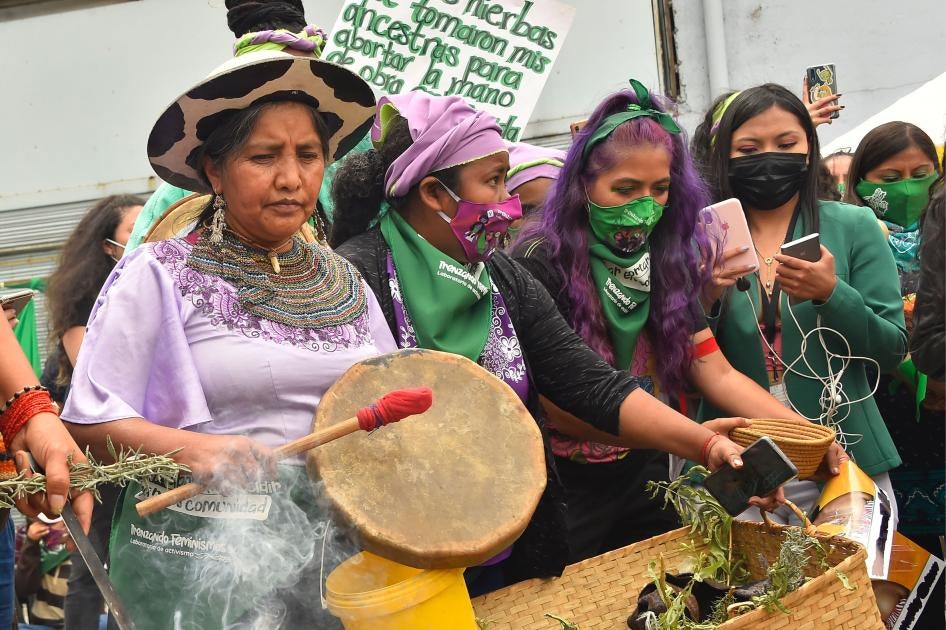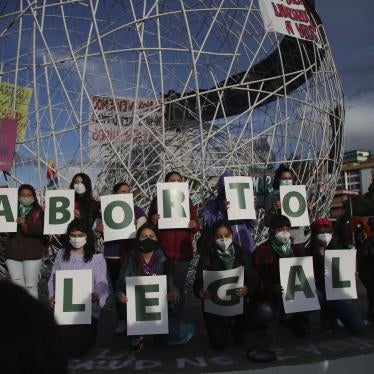In the midst of a movement across Latin America to confirm abortion rights for women and girls, Ecuador has an opportunity to move a step forward. It should take that step.
Until last year, women and girls could only seek a legal abortion in Ecuador when their pregnancy endangered their life or health or in the case of rape of a woman or girl with severe mental disabilities. But a Constitutional Court ruling last April 28 to end criminalization of abortion in all rape cases set in motion an effort to amend the country’s legislation accordingly. It has been a slow process.
Now a bill codifying that ruling – initially drafted by the Ombudsperson’s Office – sits on President Guillermo Lasso’s desk, awaiting his signature. It is a landmark opportunity to transform the lives of survivors of sexual violence in Ecuador, not only by guaranteeing them timely access to abortion but also by providing them with access to comprehensive sexual and reproductive health services. President Lasso should sign it.
We know from our own research regionally that this is a life or death issue. Abortion restrictions do not stop abortions from happening. They push women and girls seeking abortions, especially those in poverty and who live in rural areas, out of the national health system and into clandestine, unregulated settings. Many clandestine abortions are performed unsafely, leading to short- or long- term health problems, or even death. According to the World Health Organization, the rate of unsafe abortions is four times higher in countries with restrictive abortion laws than in countries where abortion is legal.
The bill approved by the National Assembly is modest but important. It aims to ensure access to priority, comprehensive, free, timely, compassionate, and confidential care for all rape victims before, during, and after abortion. To comply with international human rights standards, a law regulating access to abortion for rape survivors should not set barriers that could limit real, effective, and comprehensive access.
Because pregnancy is frequently detected late in rape cases, the bill would extend the time frame for seeking abortion, which would be of 12 weeks, for girls and women with disabilities and women in rural and Indigenous communities to 18 weeks. Under the bill, rape survivors would not have to report the crime to access an abortion, and to assure that abortion would be accessible, the bill’s allowances for providers to refuse health care on grounds of conscientious objection would be limited.
President Lasso has 30 days since he received the final text approved by the National Assembly on February 17, to approve or veto it. When the Constitutional Court decriminalized abortion in cases of rape, President Lasso issued a public statement saying that, despite his personal convictions, he and his government would honor the decision, out of respect for the basic principles of democracy. But in recent statements he has indicated the possibility of vetoing the bill.
President Lasso’s personal beliefs should not limit access to essential health care for women, girls, and pregnant people across Ecuador. He should stand for upholding the rule of law and protecting survivors of rape from suffering the harm of forced pregnancy.
A partial veto would send the bill back to the National Assembly, which could choose to approve it with or without the president’s changes. If he approves it but narrows access to abortion for rape survivors, the National Assembly should uphold its commitment to protecting women and girls by maintaining the current text with no changes.
A total veto would block further legislative action on the issue for a year, even with the court’s ruling almost a year ago decriminalizing abortion. This would leave rape survivors, health providers, and other actors in limbo and would contribute to barriers to obtain an abortion, even under the circumstances described in the court’s decision.
A presidential veto would undermine the work done by the Constitutional Court, the Ombudsperson Office, and the decision made by the National Assembly’s majority, all of which are steps forward for Ecuadorean women and girls to reclaim their own lives after the trauma of sexual assault.
President Lasso should stand for human rights and sign a bill designed to protect women and girls.









